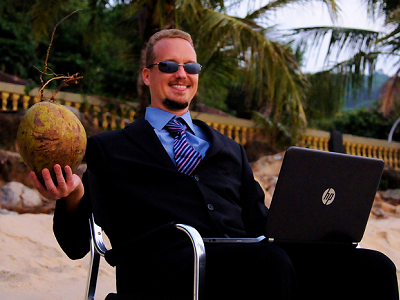
- by Dr. Mike
Many have asked me why I rejected the academic career that I had and went forward with my crazy coconut-filled freelance thing. I had spent two 6-month periods at the University of Oulu, Finland, three years at Kyoto University, Japan, and a year at Nanyang Technological University, Singapore, in a purely academic setting. Five years in total. Additionally, almost four years at ABB Corporate Research doing applied science.
All of them are top of the country and great places to do research. I could have easily continued in academia or in a corporate group where almost all top managers on the technology track had Ph.D.-level education.
None of my student buddies made this kind of move. Most of them are associate professors by now, being a fully grown academic at 40-something, soon full professors ready to sit tight in their ivory towers the rest of their lives (no offense intended, but that’s how the world sees professors, does it not, hahah?). They will never get to know how to freelance with a Ph.D.
So why did I turn freelance? Why should you? And why would anyone want to step away from the sweet university life which is famous for academic freedom and go run a freelance business instead? Sounds tedious, risky, and just crazy, right? I give you a couple of reasons that affected my decision. It was a pretty natural choice that perhaps before writing this article I hadn’t even analyzed thoroughly yet.
Now that I sat down (under a coconut tree… please note, don’t sit directly under it without wearing a helmet) to think about this, I found that there are lots of similarities and then there are parts that are completely different. Some of those differences are Good, some are Bad, and some turned out to be just plain Ugly.
But in fact, loads of things are nearly identical! And probably you see the similarities yourself if you’ve gone through the highest level of academic education there is. Here is my story including a brief retrospective analysis.
What is similar?
I suppose the most obvious similarity is freedom (1). They call it academic freedom for a reason and similarly there is ‘free’ in ‘freelancer’ telling you the same thing. In practice, freedom of pursuing your personal interests and learning goals are identical whether or not you’re a researcher or a freelancer. It’s your pick! Only the target and the rules of what counts as results are different.
Freelancers must have a monetary gain in almost every activity whereas academics don’t have that kind of primary worry. But in both cases, you get to choose what sub-goals you take to get to your final goal which for academics might be finishing that degree or later getting into the tenure track, and for freelancers getting the business going with ease yet having high profits which would lead to even more freedom.
Or you could just embrace the lifestyle you always wanted with minimal financial needs. Whatever your goal is, you’re free to pursue it!
And similarly, in this regard, those who only engage in the process with only the goal in mind might not be the ones most successful in the long run. The learning aspect is the part that makes freedom taste so good. You can try to do all the new things, as many as you like! (See also: Freelancing Is The Holy Grail)
The nature of the advice you get (2) is similar also. Doing your Ph.D. and creating your very own one-person business have a lot of common nominators in terms of what others think you should be doing. There is constant advice from people who are not in your shoes (but might have been in a similar situation in ancient career history) who are more than eager to suggest what you should be doing and how you should be doing it.
There is no such thing as bad advice, and there isn’t any truly good and easy-to-digest advice either. There’s just plenty of different kinds of advice! Yet, the choice is always yours as you must decide how you spend every hour of your life on finding clients/doing projects/getting paid vs. acquiring research funding/running experiments/publishing papers… and on resting and recharging too. Ignore one aspect and you get nothing completed.
One tip for polishing your experiment plan or executing a freelance project faster might be valid, but it is up to you to assess the validity of someone else’s advice.
In both worlds, you will also see a lot of examples of successful other people (e.g. world-famous tenure track professors or exemplary well-established freelancers) yet the responsibility of finding your own way to establish your expertise and reputation is yours and yours alone. It’s your own thing regardless of the advice. Yet, only a fool would ignore the advice altogether.
The trick in freelancing, just like in the Ph.D. process, is to mold all the tips you get to serve your own purposes in an efficient way… by intelligent adaptation.
You might remember that fellow Ph.D. student who always did what every single other person suggested. Finished nearly no research at all, got stuck in polishing the first or second research paper forever. That poor guy who never made it to the defense. It’s the same thing in freelancing. Intelligent adaptation. Getting stuff done and completed regardless of all the contradictory advice is a skill useful to both freelancers and Ph.D. students.
Intensity (3) is yet another similarity. Building your one-person business and getting a personal recognition of the highest level of academic education can be consuming especially the first couple of years when your perspective to what you are doing, what subgoals you must have, and so on are vague at best. The only thing you can do in many cases is to put more hours into working it out.
This is where Ph.D. students either keep going or quit grad. school and where freelancers either find their beautifully-defined niche or go get a day job. You will need a certain sense of persistence, long-term obsession, or even momentary insanity to keep on going through the times when nothing seems to make any sense and all of the subgoals suddenly shift.
And those who survive the process (i.e. finish the degree or get into the “good business” stage) might end up liking the intellectual challenge and repeat the process – voluntarily!
One thing you get from a Ph.D. process, at least if you manage to get your work published in the premier research forums, is the ability to think and organize your thought logically. Sounds easy to a non-scientist, but most people will never get this part truly right (even though they are sure they do)! Logical thought is perhaps at the core of everything regarding communication (4) in general.
You’ve written scientific papers, you’ve given countless research presentations, you know how to explain exactly what you’re going to do and why it matters, what you’ve done, how you measured the outcome, how the good results are, and what is still not done but is a logical next step to be taken. Your communication skills might be above average as a result of your scientific training.
We are trained to write exactly what we mean by the minimum amount of words needed – in a perfectly logical way starting with the background, main idea, and its implications leading to something we can call a conclusion. Use that to your advantage! Additionally, all that is probably done using another language than your native tongue which adds a certain level of challenge to the learning process.
Logical thinking helps in presenting yourself and your freelance services too. Even though freelancers (other than those who design presentations as their main business) don’t need to do that many presentations (5) in the same way we do it in academia, the ability to outline what you have to say to a person such as a prospective client is a core skill.
Even if you’re not a visually oriented person (I call myself a “visual idiot” because of the handicap I know I have), you’ll always excel in getting the content right. What’s relevant, what’s not? What’s the larger topic, what are just details? More or less you always know what part of your presentation relates to what else.
With a little learning (which you can do by trial and error) you can target your presentation skills directly to the assumed needs of your typical clients. That makes your presentations much more powerful than those of even trained salesmen whose sales process might lack an analysis of “why” certain things are relevant whereas others can be omitted without negative consequences.
(I have worked with professional corporate sales teams in several countries and many times I find sales discussions missing the point that the customer probably expects to be addressed. No offense intended to any salesmen.)
Continuing on the same track of logical thinking and presentation, then there are pure writing skills that can help you a lot when going freelance! As a researcher, you’ve probably written a lot of scientific text for your papers, and perhaps numerous funding applications. Guess what, writing project plans and proposals (6) is an almost identical process!
When you have a good grasp on describing the goal of your project (i.e. what your client’s problem is) and why it is relevant (the Background chapter), what is related and already done (the Related Works chapter), what you plan to do to solve the client’s problem (The Methodology chapter), and what good comes out of it (the Conclusion chapter), it shouldn’t be too big a step to take that approach and turn it into writing very compelling project proposals.
Understanding what is relevant and must be mentioned, and what can be left out being too much detail is an essential skill in both academic and freelance project proposal writing. And in both cases, when successful, they bring you funding!
Actually, you can use your logical thinking, communication, presentation, and writing skills in your sales process too, mainly because of your unusually well-trained problem-solving capabilities (7). I can honestly say, that now after almost seven years since I set up my freelance business, I haven’t mastered any sales process that is described in textbooks. At least not on any conscious level.
All I find myself doing is helping my clients solve the problem my clients think they have. First I have to scope it, then work out a high-level plan, then execute it, and verify my results. Doesn’t sound too far from the scientific process, would you think? It’s the same problem-solving process, just a slightly different target and you can skip being 99% certain about everything all the time. Many times less will do.
Sometimes, even a short expert estimate done in 1 hour is more valuable to the client than 1-month research that proves everything accurately. It depends on the immediate goal and the exact problem the client has. So, we just adapt a little from rigorous scientific problem-solving to a bit more pragmatic problem-solving. Still, we just solve problems.
Creativity (8) is perhaps surprisingly another big similarity. Although it might not be obvious, it probably rings a bell. Do you remember discussions with random other Ph.D. students you met at a conference and had a wonderful chat about what your research focus is and what the other guy is trying to figure out? Do you remember all the strange ideas when you tried to fit whatever the other person said into your research framework?
It didn’t make much sense at first but when thinking about it, you started seeing all the connections between the two worlds. That’s exactly what happens when you start working with a lot of other people, be they mostly your clients but perhaps subcontractors and other freelancers too. The connections are everywhere and you are the one who puts everything together to create something truly unique.
Harness that creative process for the benefit of your client and you might find yourself doing a very nice and highly appreciated freelance business! Never lose the creativity you had when trying to figure out what your thesis is all about. You put everything together then, you can put everything together now as a freelancer.
One more interesting similarity is the global nature of science and freelancing when it is done right.
Did you study in multiple countries like I did (Masters from Finland, Ph.D. from Japan)? Did you do a Post-Doc or held another academic position in yet another country (my case, Singapore)? Had other research positions elsewhere (I did applied science projects in Sweden)? Have you flown all over the globe to participate in academic conferences?
(I remember Long Beach, California, and Beijing, China, not speaking of Zurich, Switzerland, being the most memorable conferences.)
Then, as a freelancer who operates globally (9), you’re already there in terms of the borderless mindset that all in the scientific community have. Keep that, your global mindset works to your advantage as you can find commonalities with all sorts of people you encounter on your freelance journey. Just turn on your “conference mode” and you’re a natural!
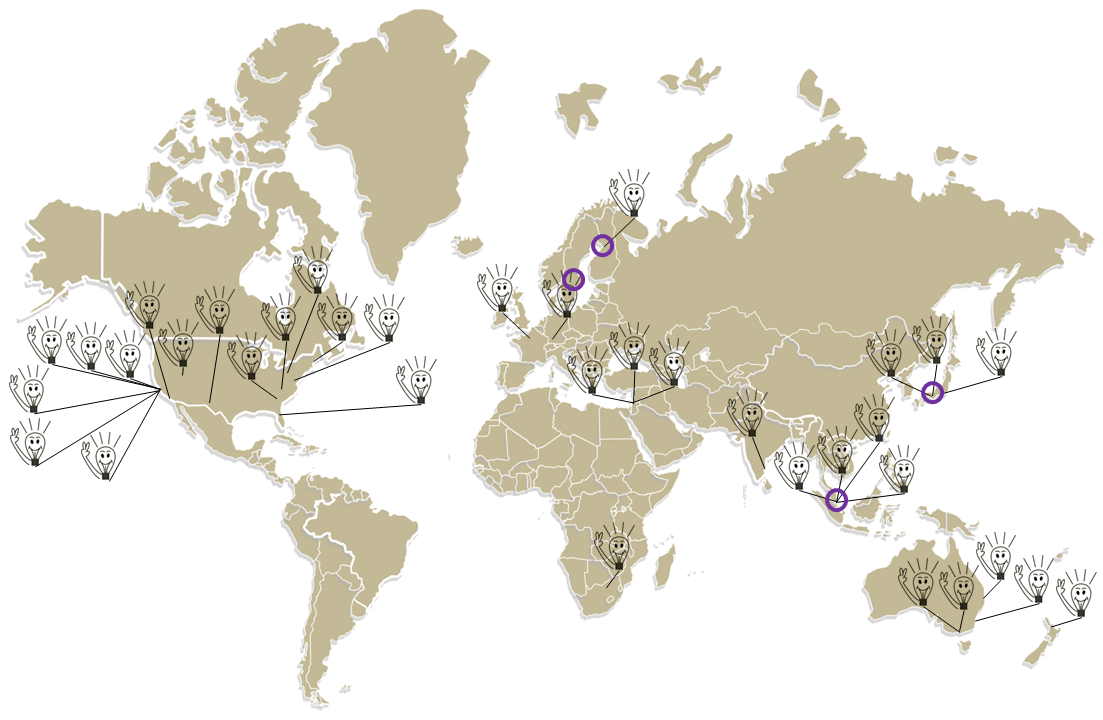
My customer map as of March 2021. Truly a global business (although the Silicon Valley area looks a bit crowded). 😉 Purple indicates the origins of my pre-freelance research positions.
High work ethic (10) requirements are similar too. You’re used to doing your own thinking, running your own experiments, performing your own analysis, and taking charge of your own learning process. Freelance work is essentially identical to doing your Ph.D. in this sense… it’s your personal thing, your personal process, every day.
And most likely, you’re someone curious who likes learning things in general, so it is easy to see the fun in it! You know that if you give in to those lazy moments even the best of us have from time to time, work won’t get done, clients won’t be happy.
Therefore, you just keep going like a machine until the whole thing is done. Not 99% but 100%. All the way. So, keeping high standards, criticizing your own work, making sure it is not just good but really good is a natural process that requires a bit more than others might ask from themselves. It is easy to keep going with the bar being always a bit on the high side.
This comes down to the last similarity: rigorous and continuous project management (11). You’ve survived your Ph.D., there is no stopping you as a freelancer when you’re free of all barriers and obstacles the academia posed to you. You’re completely free to organize your business as you see fit. Running projects after projects, as you’ve already finished a huge one feels somewhat easy.
What might you leave wondering is why some other freelancers fail in getting their scope defined properly and complain about clients producing the notorious scope creep. For us scientists, it is natural to have a long list of Out-of-Scope work items in a project proposal similar to the Limitations and Future Work chapter in scientific papers.
You probably won’t have any issues with deadlines either. You will meet them equally well as you met all of your paper submission deadlines, the tough ones that never get an extension for any reason. Otherwise, you would never have finished. You got this management side of things!
I remember my job interview at ABB Corporate Research over a decade ago. My future manager asked me if I’m good at project management to which I answered something about not having any certification. He then continued with something like “but of course you are, you finished your Ph.D. in three years.” He had finished his thesis very efficiently too, so the further discussion was skipped.
In our case, it doesn’t even occur to give some lame excuses for delays like the dog ate my homework which I see many others asking tips for on freelance discussion forums. Essentially, delays are unacceptable just like sending paper drafts to a conference management system is useless when the deadline has passed, even if just one minute ago.

We don’t need to go this way. We got this project management thing… 🙂
Overall, there are at least eleven similarities that make turning freelance seem like not a big step for a Ph.D. holder! Then, why not do it?
What is different?
The above is just half of the story. There are several aspects that are entirely from a different planet when it comes to doing freelance work compared to pursuing a scientific career.
The Good
One thing I truly love in freelancing is the lack of politics. You don’t need to worry about office politics, promotion criteria, or the interests of famous professors you might need for endorsing your academic career. No political conflicts that kill projects such as my plan to do the last and biggest validation experiment in collaboration with cardiovascular surgeons.
The entire Department of Cardiovascular Diseases went on a strike just before my experiments were scheduled to start! It had absolutely nothing to do with me nor could I have affected the outcome. Just some political conflict somewhere up in the organizational hierarchy. So I had to change everything about my experiment plan to target urologists instead.
A very nasty process when it came at the last minute when I only had a few months left before my defense. The most stressful time of my life! I have not faced a similar show-stopping political conflict as a freelancer, ever.
In a company of one, the only show-stopping conflicts you might get might be your left brain battling with your right brain! 🙂 The solo setup smoothens the work process and reduces the dependencies compared to academic research. It’s so nice, so efficient!
Not having any organizational limits is the part I might have to say I like best of all. Because of the lack of politics, nothing stops me from working or collaborating with others. It is nothing like the constant and well-known constant but friendly competition between us Kyoto University boys and those Tokyo University rascals. 🙂
As a freelancer, you can move vertically, you can move horizontally, you can move in the third dimension too (which would perhaps in this context mean working across domains). You’re not limited in any way to do just about anything you can think of. So, you can go search for clients from the other side of the globe if that is where you think your skills make the biggest difference.
Yet, you’re free to join any suitable organization that might suit your needs, for instance, professional associations, freelancer groups and meetups, open chat channels, any number of good freelance sites, etc. There are literally no limits other than the use of your own time.
Overall pragmatism and the lack of bureaucracy make up another big difference. You don’t need to worry about how something could be done or if it could be done at all, you just go ahead and do it! Say your laptop broke down all of a sudden on a deadline day.
A quick run to the nearest electronics shop, getting a new one, shoving the receipt under your expenses folder, booting up, and installing all the essentials is all you need to do. Imagine, what trouble you’d need to go through when the IT helpdesk of a bigger organization must be involved! Queue up, baby!
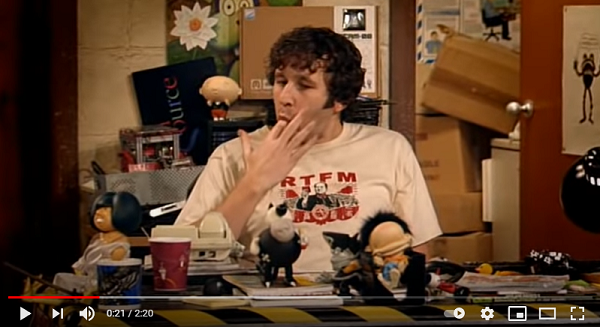
“Hello, IT. Have you tried turning it off and on again?” As a freelancer, you don’t need the IT Crowd to handle everything IT because that’s their job, not yours. Everything is your job. It’s a good difference. 🙂
I remember starting as a young assistant professor and volunteering to do BYOD (bring your own device) instead of asking the university for a laptop. I knew how the purchase process would (not!) work so I didn’t need to bother the IT support at all. 😉
There are numerous other benefits of having full control over everything that relates to your business operation. For instance, a friend of mine from Kyoto University now running his own lab in another highly-reputed university, cannot get simple software prototyping tasks done by anyone professional.
Why? Because the university’s bureaucracy does not support making payments on freelance platforms where the whole thing would be done in less than a week! He is stuck in getting the work done by students who don’t yet have the necessary skills to finish things effectively or contracting local agencies that are too expensive and too slow for getting small-scale jobs done.
So, many of his ideas die off because of these kinds of obstacles in the practicalities. Can’t get it done unless you do it yourself. On the opposite end, we have freelancers. Freelancers demonstrate the ultimate business agility.
All of the above leads to the last of the good differences in a way: speed. Depending slightly on which university’s organizational system you might have belonged to, it is common, like in many public sector organizations, that efficiency is not always the key to success. But in freelancing it is! Only the good-and-fast kinds survive freelance careers for several years. Slow ones die off. Not-so-good ones go soon after them.
Now, who’s faster than a freelancer? Only another even faster freelancer!
The Bad
The lack of easy and secure income is something almost all freelancers miss at some point. There are no cozy breaks in freelancing and the delivery-based business has its risks. On the other hand, what is riskier than being a super-green researcher-wannabe with a fresh Master degree in the hands than continuing academic studies all the way to the end knowing the process is highly personal, full of critical deadlines, and you have no idea how it is going to turn out or how long it takes.
It’s a similar step into the unknown. But still, I’d argue that the academic life, may it have been including doing research, teaching duties, and other quite stable stuff appears way more cozy than the uncertainties of freelancing. At least in terms of the monthly paycheck. I’d even argue that this is probably the biggest reason why we see so few Ph.D.’s freelancing, still.
It might look like a financial death trap at first. And to be honest, it could be exactly it if you couldn’t find a good profitable niche where your unique specialty plays to your advantage.
Also, the lack of predictable career progress in the traditional sense is an obvious downside. Turning freelance means you’re probably never going to make it to a professor even if you changed your mind later on. And knowing that, you probably decided that the professor’s job is not for you anyway.
But as a freelancer you depend on your own skill only, not politics, not your publication list, not the appearances in top conferences of your domain, so you need to go your own way completely without a reference framework about how it is supposed to go.
What adds an additional level of difficulty is the fact that there are so few others who have gone this way after finishing a Ph.D. that you might never even meet anyone with your kind of background during your freelance journey (assuming it goes well and you’re quite busy with your clients). So, inevitably, you’re out and alone in the dark when you turn freelance.
The Ugly
There is one last difference that I’d have to list under the category of The Ugly. You might end up getting a so-called “bad boy” or “renegade” reputation among your old graduate school buddies, professors, and other pure academics (although many might secretly envy you, hahah… they just regret they didn’t take the bold step themselves).
Some might not want to be your buddies anymore. I mean something like people might be thinking “this guy had it all but he threw it all away!” That is probably one of the worst parts that might come out of your decision to go freelance. And it is ten times as bad if it goes south when it means you had tried freelancing for a couple of years, failed, and you have no way back anymore even if you had changed your mind.
Your career options after failing a freelance career might be very few.
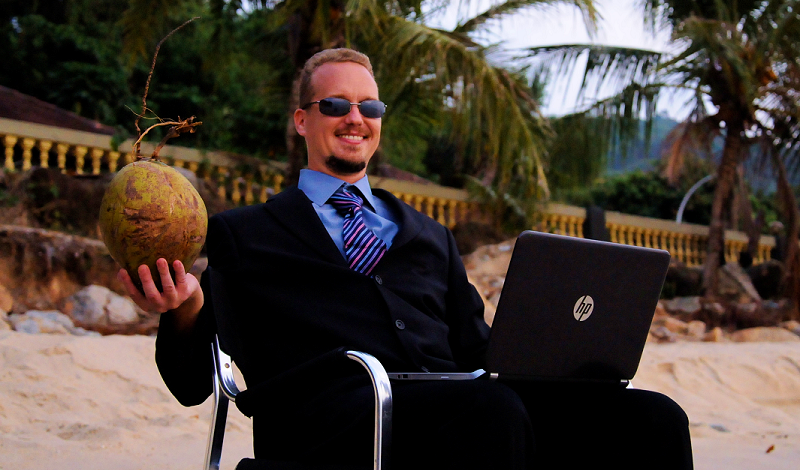
Many said I went nuts when I started to freelance. And I did! I went totally coconuts! And I’m not regretting a single day.
OK… but how to freelance “like a boss?”
Freelancing is an expertise-based business and a way of life in fact. Why I believe it is only the high level of expertise that makes freelancing sweet is explained in the ”It’s an Expert’s Game” article. In short, it is only those few who can do much more than most who can earn multiple times the normal average. Whatever is considered “normal.”
That is if you know how to price your services according to the value to the client. But for smart guys learning new things quickly such as Business 101 is not a big challenge.
Let me just list a couple of main points about how have I benefited from my Ph.D.-level scientific training and how it made me a freelance business person. My example is very straightforward.
My thesis work focused on virtual reality (VR)-based training simulators in the era when the research was booming but the industry was nearly non-existent with just a few viable domains where safety is paramount, namely, aerospace and medicine. Now, as the technology has evolved (better and cheaper hardware, quick-to-build software development tools, digital asset stores, etc.), training simulators have become an industry on their own.
In 2017, i.e. in my fourth year of freelancing, I switched my focus from 3D sensor-based augmented reality (AR) applications to VR with the exact excuse of having done a Ph.D. on the very topic of training simulators.
My original research work targeted medicine as the application domain exactly a decade earlier, and my freelance work expanded the application domains project by project: construction, food & beverage, rescue, sailing, and so on. There was literally no better time to make my move from one niche to another than 2017!
The industry was nascent but booming and I was one of the few with up-to-date hands-on skills as well as a scientific understanding of the mechanisms of learning with the help of VR technology. Also, pay per project correlated very nicely with the expertise. Again, like with my first niche, I had little if any competition even in the global freelance sites. Sweet business. 😉
And the above is only the part that relates to the technical domain, in my case, VR training simulators. But there is much more!
As a Ph.D. holder, it is not only the highly specialized competence that you obviously gain if you manage to turn your thesis work into a freelance business or at least part of it, you also gain a permanent marketing advantage. Most career freelancers are good, highly specialized, and great at doing the work.
But they’ll never look as smart and as specialized as the guy with a Ph.D. The smart look comes with the title and you should utilize it to your advantage without remorse! Think about it, the degree alone puts you in the top 0.01% category of freelancers in your field (the number is just my guess here, it might be much lower), pretty much regardless of what that field is.
There are so few of us educated scientists doing freelance. Use the marketing advantage. This worked brilliantly for me from the start.
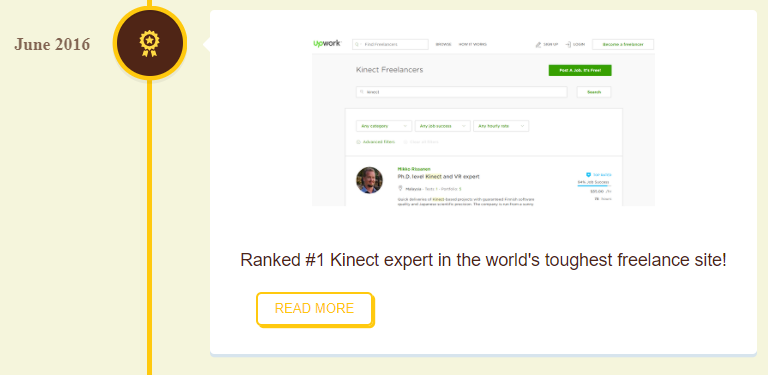
No need to be humble and hide your unique expertise. Let it help you totally crush it for instance in online marketplaces.
Every now and then I encounter a random client online who is working on some particular problem relating to augmented reality (AR) or VR. Just to demonstrate the width of the background I might share a link to a science paper or a patent developed over a decade ago that describes something the client has never even imagined yet.
Being an ex-researcher means you’re placed ahead of the curve in many ways. Most of what you’ve done years ago in the research stage is still brand new stuff in the industry! That’s how progress is supposed to work anyway, so no surprise there, really… which is why I still keep my archived research pages available online.
The depth of your competence is very easy to demonstrate as a big part of your background is publicly available. Even clients who are not exactly scientifically literate will perceive the magnitude.
One of the peculiar things is that since you know exactly what academia needs and how things work over there, it is quite easy to nail projects that universities are seeking externals for. Actually, many of the projects I got in Freelance Year 1 were targeted academia. My first freelance project was funded by a 1-million-yen innovation award by Kyoto City, an opportunity that I only reached via my good old student buddy.
I also made AR prototypes for Ph.D. students who studied kinesthetic learning, I had Ph.D. students my ex-professor paid me to guide in his stead, I made computer vision algorithms for tracking medical student’s fingers when practicing on a surgical box trainer device, and made various other research tools and instruments for universities.
I admit it, I took the low-hanging fruits to test the ice on purpose since I had no real business skills whatsoever in the beginning. Start with what you can start with and improve your business as you gain experience.
The only thing hindering the enthusiasm in doing freelance work for universities might be the pay scale. The private sector simply pays better, so once that side is going, your academic projects start to feel like hobbies when you compare the time spent to the money that comes.
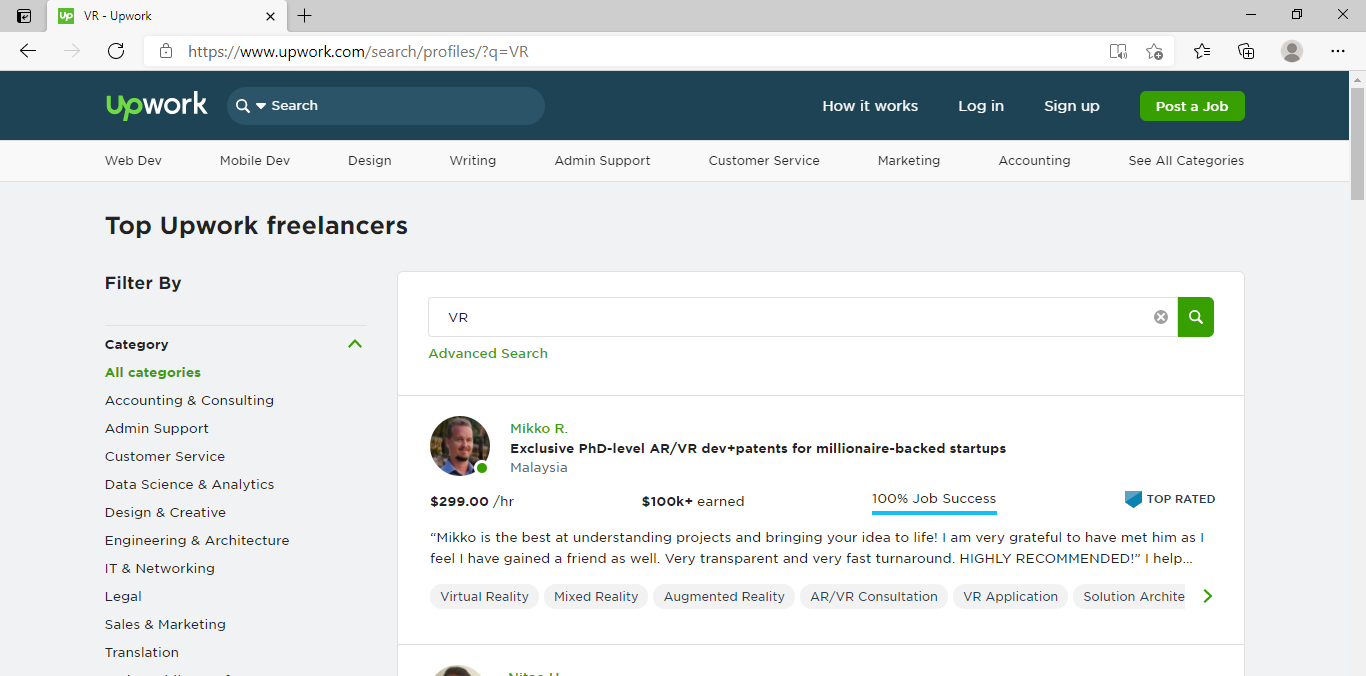
When your freelance business is perfectly aligned with your unique super-specialized skills, you can afford to exclude all but the best types of clients.
Another thing that I find being a core skill of sorts is precision and the understanding of certainties. The meticulousness required for preparing experiments, writing scientific papers, and formulating the conclusions presented in conferences has been a great asset in almost every aspect of the work. Everything I do comes with a label “with Japanese scientific precision” and my clients do seem to appreciate that.
That combined with the rigorous project management methodology creates execution excellence that most do not achieve in their lives. It is not difficult to guarantee client satisfaction once a project is started… but I may take some time to consider, plan, and think things thoroughly through before engaging in a contract, particularly if the connection happens online.
The ability to find everything that is relevant and exclude all irrelevant things that relate to my client’s project is yet another embodiment of the scientific thinking process that runs in the background. Ph.D. = Permanent Head Damage sounds exactly accurate! 🙂 Your thinking will never degrade to the level of “ordinary people,” if I put it in such an elitist way. It is not difficult to turn that to your advantage in most aspects of work that require thinking and planning.
Here are a couple of examples from random people I met on a freelance site who didn’t seem to mind paying top dollar for the precision work that I delivered.
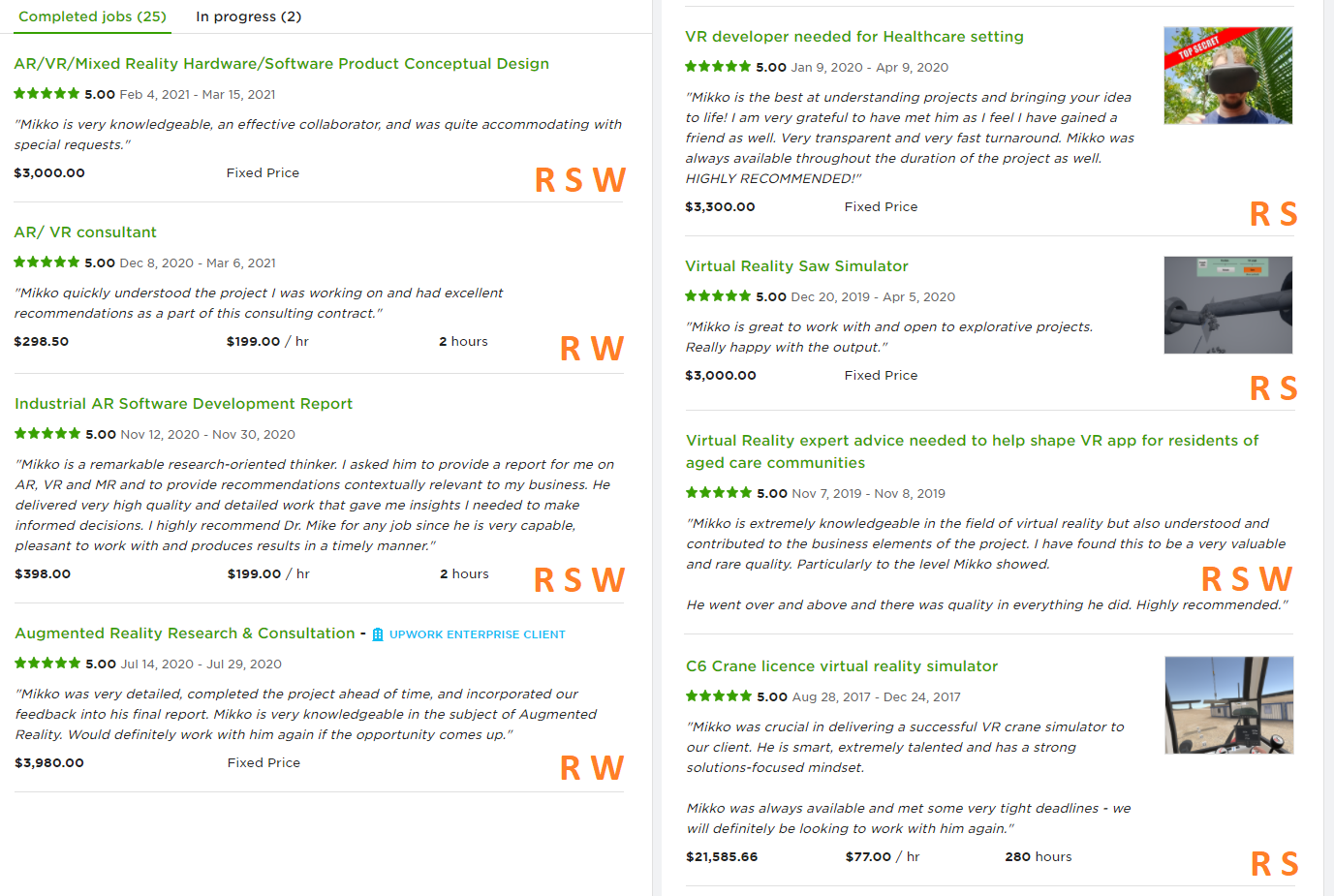
Do you see the pattern? (R = client appreciated my ability to identify what is Relevant. S = client appreciated my VR-related Substance skills. W = client liked my Writing and documentation skills.)
There are far more sides to this than what I can list here that make Ph.D. holders excellent freelancers by default. It does require some learning, though, and doing business is fundamentally different from doing science. Anyway, learning is what scientists do, so the step may look bigger than it actually is.
I did it, so can you. Are you a scientist thinking of “going rogue” and make your own way in your professional life? Let me know, I’d love to hear from you!
Dr. Mike
Mikko J. Rissanen, Ph.D., a.k.a. Dr. Mike, is an accomplished solopreneur living in a tropical paradise, inventing cool tech and coding from his beach office... and eating coconuts all day, every day. He has been running his one-man show in Penang, Malaysia, since 2014 until he moved the business to the United States as I2 Network in 2021. He is one of the most highly paid freelancers on Upwork and he has been supporting hundreds of starting freelancers since 2017. Follow his latest tips on LinkedIn or seek his personal guidance as a CoachLancer member!